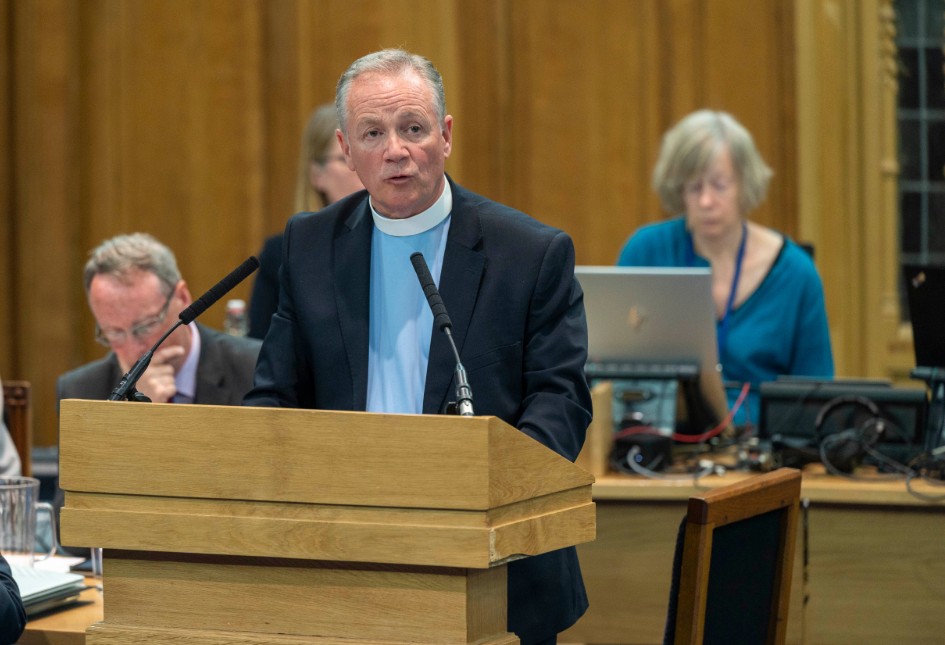Published on 19 May 2025
3 minutes read
Even more difficult decisions will be required in future if the Church is to achieve its aim of balancing its budget, the General Assembly heard.
The warning came from Rev David Cameron, convener of the Assembly Trustees, as he presented his annual report.

Assembly Trustees convener Rev David Cameron addressing the Assembly.
The report revealed an operating budget deficit of £5.898 million for 2024 and warned that while on paper it looked as though the Church had an abundance of wealth “in reality, this is simply not the case” and cuts would always be necessary unless it could grow numbers.
However, Church membership fell by 5.5% in 2024 as part of a continuing decline which has seen a 35% decrease over the last decade.
Mr Cameron stated: “We are gathered at a crucial moment in the life of the Church of Scotland.
“The urgency of the current financial situation demands even more difficult decisions.”
Revealing that in December 2023, the Church’s available free reserves would have covered less than five months of operating costs, Mr Cameron reminded commissioners that the 2024 Assembly had called on the Assembly Trustees to achieve a balanced budget by 2027 as a necessity for the Church’s future.
However, since then, income had continued to fall in real terms while costs rose, prompting the implementing of measures that the Church had hoped to avoid, including proposals for compulsory staff redundancies and a reduction in the Seeds for Growth budget, which supports local missional initiatives.
Mission not a luxury
Yet, despite these challenges, the mission of the Church is not suspended and its resources empower the Church to live out its missional calling, Mr Cameron added.
“While finance may be a key, the door it opens is not financial alone—it is missional,” he said.
“Growth through mission is not a luxury. It is the essential pathway to the deep, adaptive change that our Church requires.”
This was why the Assembly Trustees were committed to supporting mission-driven local initiatives focussed on intergenerational worship and reaching out to the under-40s with 16 Seeds for Growth projects approved and a further eight recently awarded funding.
But the Church had to go further.
The Assembly Trustees, together with the Faith Action Programme Leadership Team (FAPLT), was looking at ways of planting new worshipping communities where young adults live, study, and work, he said.
At the same time, the Trustees were working to enable a Church that is better equipped for the future by developing a new sustainable financing ministry model to be brought to next year’s Assembly.
“We are called to steward the Church’s future with integrity, and these proposals reflect that responsibility,” Mr Cameron added.
“We cannot simply hope that one more initiative, one more policy change, or one more cut will bring the renewal we long for.
“We must stop managing decline and start reimagining our witness, trusting that in losing what we cannot keep, we will find again the life we are called to share.
“It requires courage – to let go of old ways that no longer serve us, and to embrace new ways of being the Church in a shifting world.
“It is my prayer that we will be bold in our decisions, faithful in our commitments, and open to the adaptive change that lies before us.”
Retirement timebomb
Asked by Rev Scott Burton of Brightons Church in Falkirk if he was anticipating the number of ministers falling below the current 600, Mr Cameron conceded this was probably the case.
“Moving forward, we are really going to have to identify increasingly flexible forms of ministry,” he continued.
“We also have to be aware of the pressing issue of the retirement timebomb facing our Church: 77% of our ministers are over 50, 17% are over 65. Unless there is a significant change, we are not going to have enough ministerial staff to cover the needs of our presbytery plans.”
Rev Jane Howitt, chaplain at Heriot Watt University, was concerned about the potential impact on congregations in priority areas following new rules that charges designated as insolvent would not be permitted to call a new minister.
“One of the features of our Presbyterian Church is that we share resources. We are partners in the Gospel mission that Jesus entrusted to us,” she said.
However, Mr Cameron assured her that subsidies from the central Church to priority area parishes will remain unchanged.
He later told the Assembly: “We are all in this together. We are making changes in the Church in order to get to financial sustainability to enable us to invest in that future.”